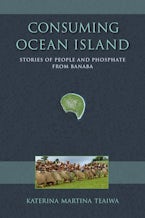- Home
- Consuming Ocean Island
Preparing your PDF for download...
There was a problem with your download, please contact the server administrator.
Consuming Ocean Island
Stories of People and Phosphate from Banaba
Published by: Indiana University Press
264 Pages, 38 b&w illus., 2 maps
- eBook
- 9780253014603
- Published: December 2014
$9.99
Other Retailers:
Consuming Ocean Island tells the story of the land and people of Banaba, a small Pacific island, which, from 1900 to 1980, was heavily mined for phosphate, an essential ingredient in fertilizer. As mining stripped away the island's surface, the land was rendered uninhabitable, and the indigenous Banabans were relocated to Rabi Island in Fiji. Katerina Martina Teaiwa tells the story of this human and ecological calamity by weaving together memories, records, and images from displaced islanders, colonial administrators, and employees of the mining company. Her compelling narrative reminds us of what is at stake whenever the interests of industrial agriculture and indigenous minorities come into conflict. The Banaban experience offers insight into the plight of other island peoples facing forced migration as a result of human impact on the environment.
Prelude: Three Global Stories
Acknowledgments
Notes on Orthography and Geography
Part I. Phosphate Pasts
1. The Little Rock That Feeds
2. Stories of P
3. Land from the Sea
Part II. Mine/lands
4. Remembering Ocean Island
5. Land from the Sky
6. Interlude: Another Visit to Ocean Island
7. E Kawa te aba: The Trials of the Ocean Islanders
8. Remix: Our Sea of Phosphate (photo essay)
Part III. Between Our Islands
9. Interlude: Coming Home to Fiji
10. Between Rabi and Banaba
Coda
Ocean Island/Banaba Timeline
Notes
Bibliography
Katerina Martina Teaiwa is Head of the Department of Gender, Media and Cultural Studies and Pacific Studies Convener in the College of Asia and the Pacific at the Australian National University. Born and raised in the Fiji Islands, she is of Banaban, I-Kiribati, and African American heritage.
"Teaiwa deals with the great sense of betrayal, loss, and displacement indigenous Banabans suffered through as well as the harsh physical toll decades of excessive mining has taken on the land. With a justified sense of outrage, Teaiwa educates her audience without alienating it, laying bare the consequences of reaping such a natural bounty at the expense of others."
~Publishers Weekly
"Recommended."
~Choice
"A detailed ethnography of Banaba undertaken by a researcher who hails from this 'very, very small island' . . . is an example of reflectivity and insightful scholarship. This is not a book to be taken lightly, but rather should be suggested to anyone with an interest in material culture, globalization, and post-colonial and ecological studies."
~Antipode
"Teaiwa displays artfully the powerful potential of interdisciplinarity as an approach toward gaining a richer and deeper understanding of Pacific pasts and peoples."
~The Contemporary Pacific
"By bringing gritty ethnographic detail, an omnivorous approach to sources, and surprising narrative innovations to bear on such topics, Teaiwa's book moves the social history of Earth's biogeochemical cycles into fertile new terrain."
~The Journal of Pacific History
"Consuming Ocean Island is an ethnographic and analytic tour-de-force. Writing an intimate cultural history of the island of Banaba, Kiribati, conjoined with a history of phosphate and its extraction, Katerina Teaiwa places us amid unsettling stories of mining and its violent transformations—phosphate turned to fertilizer, a bountiful Pacific homeland left desolate, a people and their island's very earth dispersed around the globe. In part a moving family story, this brilliant ethnography offers new ways to track globalization, dispersal, and creative recovery."
~Kirin Narayan, author of Alive in the Writing: Crafting Ethnography in the Company of Chekhov
Read an excerpt Read an SBS Australia article about the book Connect with the author on Twitter Watch the trailer for the book:


